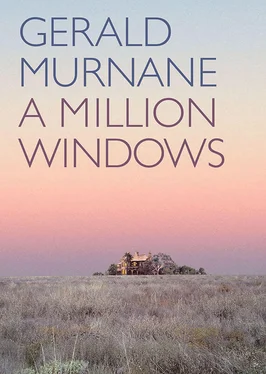From all that she had surely said to him during three hours or more, he later recalled only one sentence or, rather, the substance of one sentence. He had never forgotten her having asked him one afternoon, while the train was approaching the suburb where they both lived, whether he was interested in — did she say films or movies or pictures ?
Among the authors who have never been committed to explaining the behaviour, so to call it, of characters, so to call them, are the authors who are committed to reporting a certain sort of detail. This is the detail that occurs unexpectedly and unbidden and as though meant to occupy a blank or an absence in the place where images of details or even of words or phrases or sentences appear to writers of fiction. A certain sort of writer, after having written all that could seemingly be written about a character unable to recall more than three words that might have been uttered by a certain dark-haired young woman — a certain sort of writer might have stared at those words themselves where they appeared at the end of a short paragraph; might have heard the words seeming to sound repeatedly in his mind; and might have seemed to feel the beginnings of an unease or discomfort or distaste seemingly connected with the words until there appeared in place of the words detail after detail of the sort reported in the following paragraphs.
If I know anything about him and his struggles to write fiction while recalling not seeming facts but absences, lacks, lacunae, he would sooner or later have decided that her asking him about films, or whatever was her actual word, had decided the future of their friendship, so to call it, and would have come as a relief to him. Since the afternoon when they had begun, at last, to talk together, he would have struggled during their absences from one another, and perhaps even during their brief conversations, to form some or another series of mental images linking their present unpredictable circumstances with the well-established series of future events that had seemed to him, since they had first looked at one another, their inevitable future. In short, he would have struggled to foresee how a young woman, hardly more than a girl, and a young man, hardly more than a boy, she in a fetching uniform of brown with blue and gold trimmings and he in plain grey with a cap of faded blue — how those two could bear to spend year after year engaged in trivial matters while knowing all the while that a notable future awaited them: that they would be in due course boyfriend and girlfriend, an engaged couple, a married couple, a pair of honeymooners, and, finally, the parents of numerous children. His relief would have come from her having given away some part, at least, of the future that she foresaw for the two of them. Her question had told him that they were not merely to talk at length to one another by telephone or in one another’s lounge-room; nor would they write long letters to one another. He had understood at once where her question about films was meant to lead them, and he had understood at once that he would not be led in that direction. She had answered in part his unasked question: how could she and he endure the many dull years before their dream-future overtook them? On many a Friday or Saturday evening they would sit together in the Plaza or the Paramount, which were the two cinemas in the suburb adjoining their own.
Did he never, while they talked in the train, enjoy for a little the awareness that an actual future was now before him; that he could rest for the time being from his strenuous day-dreaming and watch actual events unfolding around him and her? He recalls no such pleasant interludes. Words, words that had him constantly adjusting his assumptions of two years past, were issuing from the mouth of someone who had been during all that time as silent as a statue and had seemed to speak only when he had willed her or, rather, her image to speak what he had composed on her behalf. Did he never, while they talked in the train, try to persuade himself that his two-years-long dream had come true: that he had now gained the friendship of a flesh-and-blood person and had no longer to court a creature of his own devising? At his desk in the house of many windows, he recalls no such efforts. All he recalls is his having decided, whether soon or late during the few weeks while they talked, that his earlier state had been preferable to his later; that he may well have been in love with Dathar but he could never be in love with Darlene.
Their suburb was a new suburb that had been a few years previously a cluster of industrial buildings surrounded by swampy paddocks and bisected by a railway line. His and her families were unusual, the parents having paid deposits on cheap weatherboard houses after having lived for years in rented cottages in inner suburbs. Most families in the suburb were young couples, as they were called, with two or three small children. Hardly any householder owned a car. Buses carried women to the shopping centre in the adjoining suburb, families to church on Sunday, and, on Friday evening and Saturday evening, a mixture of persons to the two rival cinemas mentioned earlier. His mother had occasionally taken him and his brother on the picture bus, as it was called, to watch some or another comedy film at the Plaza or the Paramount. The bus had been always crowded — these were the years before television — and the pairs of passengers who had seemed to him boyfriends and girlfriends were dressed in what were almost certainly their best outfits and conducted themselves as though an evening at the Plaza or the Paramount was one of the chief events in their lives.
Only four years after Darlene had asked whether he was interested in films, he had begun writing in a journal long essays meant to decide how he could best express the wealth of meaning that he felt urged to express: whether the best means available to him was film or live theatre or prose fiction or poetry. The writer of the essays thought highly of film, but the young man, hardly more than a boy, who was asked about his interest in films thought at once not of a screen covered by images expressing a wealth of meaning but of the dark interior of the picture bus late on a Friday or a Saturday evening. The young persons in the bus, some of them no older than himself and the young woman who had questioned him, had seemed to expect much from film while they had travelled in the bus, a few hours earlier, towards the Plaza or the Paramount but had seemed on their journey homeward to have been disappointed. The young man who had been questioned and who had sometimes himself travelled with his mother in the picture bus could not have explained the disappointment of the young travellers homeward, but some or another man in the same wing of this building where I presently sit writing — some or another man may be about to write that the travellers homeward had earlier looked forward to seeing images of actual persons in actual places by definition more worthy of notice than the streets through which the picture bus travelled; the travellers had been able for a few hours to study the behaviour of their betters and to learn superior ways of dressing, of speaking, of kissing, even. Now, the travellers were back in the picture bus, and even if they turned away from one another and looked hopefully outwards they saw only vague images of themselves in an image-bus travelling through actual darkness.
In a work of fiction intended to provide its readers with the sort of experience available to watchers of film, a young male character might well be reported as seeing in his mind image after image of himself and a young female character while he and she travelled in the picture bus from their suburb to a neighbouring suburb, while they sat together in the Plaza or the Paramount, and while they later travelled homeward in the bus. The images would have appeared to the young male character soon after he had been asked by the young female whether he was interested in pictures; by which she meant sequences of images shown in places such as the Plaza or the Paramount. The same images would have appeared again to the young male character on the afternoon after he had been questioned and while he was walking with deliberate slowness through the streets of the inner suburb where he attended school so that he would arrive at the railway station after his usual train had left.
Читать дальше









